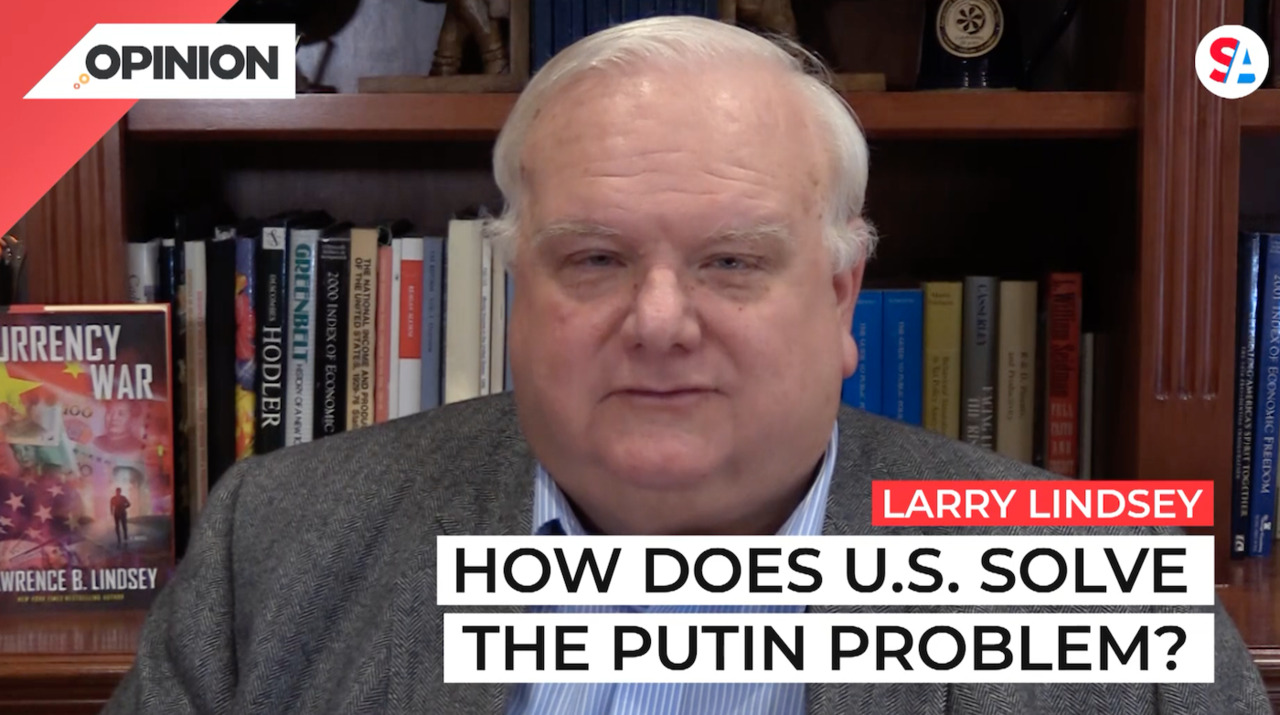
Commentary
-
Our commentary partners will help you reach your own conclusions on complex topics.
The president kind of stepped in it, or so his staff thought. when he said that Vladimir Putin had to go, could not remain in power. Well, the staff walked it back. They had an implausible explanation for what the president meant. I don’t think anyone really believed them. And they even got the president to say, that’s not what I said.
Well, whatever, perhaps he shouldn’t have said it, but let’s face it. Our objective in this war is regime change in Moscow. The president already has called, excuse me, Putin, a war criminal. Well, what exactly does that mean? Is there a negotiated settlement? Is the US willing to leave a war criminal in power? No, of course not.
It has been our policy to …have a regime change. Now, the reason it was pulled back was that it will make a settlement, if one is to happen, much more difficult. Why after all would Putin negotiate the end to a war if he knows he’s going to be arrested and tried as a war criminal. It just doesn’t make sense.
And that’s why the staff president’s staff was so eager to walk back his comment. They didn’t want to slow down any possible progress in the talks. Now, what has US policy been? Well, first of all, the US talked up how powerful its sanctions were gonna be. It tried to reassure Ukraine that Russia would never invade because the sanctions would be so powerful. And although it was perfectly within his rights in terms of domestic politics in Ukraine, President Zelenskyy was poking the bear next door in a lot of his rhetoric. Well, that was part of the confidence building. He might not have done that had he not been. Then the day of the invasion, the president says, no one ever thought that the sanctions were going to stop anything from happening. That’s a direct quote. Well, if that’s true, why were they talking about how tough the sanctions were? There wasn’t really a reason to reassure Ukraine the way we did, if we didn’t think they were gonna work. Then after the war began, we sent Ukraine just enough weapons to carry on a battle, kill Russian soldiers, but not enough to win.
And the result has been 10 million refugees who have had their homes destroyed in the process and thousands who have died on both sides of the battle. It would be as if we were perfectly willing to let Ukrainians fight and die to promote our objective, which was to remove Putin from power.
Now that sounds harsh. I don’t mean it to sound harsh. It is what has often been called “real politic.” It is the way business is done among nations. And it does definitely make sense to get Putin out of power. It’s perfectly reasonable to try him as a war criminal, which he is, but we should be honest with ourselves that that’s really our objective here. Um, in the end, we are causing Ukrainians to lose people. In fact, the Ukrainian deputy, uh, prime minister said, what, are they going to protect Poland by piling up a bunch of Ukrainian bodies at the border?
Yes, it is cynical. Unfortunately it is also how things happen now. What should we be doing going forward? Our sanctions are gonna remain in power almost no matter what happens. If there’s a negotiated settlement, we go back to the problem with, what we do with Putin. There could be regime change in Moscow, brought about by the Russians. FSB walks in and puts a bullet in his head. I mean, no, one’s gonna cry, but nor are we gonna reward those people who stage the coup by suddenly withdrawing sanctions to help them. They still have a war going on in Ukraine. So that’s not going to end the sanctions or they can slug it out, which it looks like is what’s going to happen, which is also going to keep sanctions in place.
So it looks like our course forward is well said. No matter what happens, our sanctions are gonna remain in place no matter what happens. There’s probably gonna be continued bloodshed and hopefully at the end of this, we will have regime change in the Kremlin.
-
Election 2024 will boil down to the Great Lakes states
Pollsters and pundits have been engaged in a long debate about how Biden or Trump might win the 2024 election, with much of their focus spent on the “swing state” electoral battlegrounds. While the winners of Alabama or California may be obvious, for instance, who wins Pennsylvania is a more difficult question. Watch the above…
-
Why the Fed should consider Theory of Reflexivity when fixing policy
The Theory of Reflexivity, often used in the context of economics and financial markets, implies that investors don’t base their decisions on reality but on their perceptions of reality. This creates a feedback loop where investors’ perceptions influence economic fundamentals, which in turn alter investor perceptions. Watch the above video as Straight Arrow News contributor…
-
Federal Reserve surpassed its own wildest expectations
On May 14, the U.S. Bureau of Labor Statistics released the most current producer price index (PPI) report, which showed an increase of 0.5% month-over-month in April. After the report’s release, U.S. Federal Reserve chairman Jerome “Jay” Powell said that while he believes the current policy rate is restrictive by many measures, the Fed needs…
-
Polls give slight advantage to Trump in Electoral College
With the U.S. general election only six months away, leading candidates President Joe Biden and former President Donald Trump appear to be engaged in a very close contest. In their 2020 race, the winner of the Electoral College was ultimately determined by a relative handful of voters in just a few swing states, even though…
-
College sports is big money but not everyone benefits
March Madness has wrapped up and Caitlin Clark has emerged as a household name as well as a wealthy student athlete. Earning over $3 million throughout her college career, her success stands in stark contrast to the previous notion that collegiate athletes shouldn’t earn anything beyond their scholarship. Straight Arrow News contributor Larry Lindsey examines…
Latest Opinions
-
 U.S. Department of Defense
U.S. Department of Defense
Congress still trying to figure out how to reduce wasteful military spending
-
 DVIDS
DVIDS
US Navy, Air Force making waves with new weapons at RIMPAC
-
 Getty Images
Getty Images
Israeli PM Netanyahu meets with Trump at Mar-a-Lago
-
 Getty Images
Getty Images
Growing US nuclear power resurgence reaches the nation’s heartland
-
 Getty Images
Getty Images
Beer from the sun, other solar thermal projects get government funding
Popular Opinions
-
In addition to the facts, we believe it’s vital to hear perspectives from all sides of the political spectrum.


